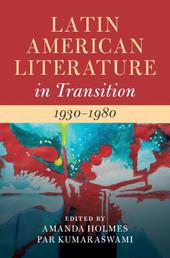
|
Latin American Literature in Transition 1930-1980: Volume 4
Hardback
Main Details
Description
Latin American Literature in Transition 1930-1980 explores the literary landscape of the mid-twentieth-century and the texts that were produced during that period. It takes four core areas of thematic and conceptual focus - solidarity, aesthetics and innovation, war, revolution and dictatorship, metropolis and ruins - and employs them to explore the complexity, heterogeneity and hybridity of form, genre, subject matter and discipline that characterised literature from the period. In doing so, it uncovers the points of transition, connection, contradiction, and tension that shaped the work of many canonical and non-canonical authors. It illuminates the conversations between genres, literary movements, disciplines and modes of representation that underpin writing form this period. Lastly, by focusing on canon and beyond, the volume visibilizes the aesthetics, poetics, politics, and social projects of writing, incorporating established writers, but also writers whose work is yet to be examined in all its complexity.
Author Biography
Amanda Holmes is Associate Professor of Hispanic Studies at McGill University. She has written extensively on Latin American cultures. Her publications include City Fictions: Language, Body and Spanish American Urban Space (2007), Politics of Architecture in Contemporary Argentine Cinema (2017), and Cultures of the City: Mediating Identities in Urban Latin/o America, co-edited with Richard Young (2010). Par Kumaraswami is Professor of Latin American Studies and Director of the Centre for Research on Cuba/Cuba Research Forum at the University of Nottingham. Her publications include Literary Culture in Cuba: Revolution, Nation-Building and the Book (with Antoni Kapcia, 2012) and The Social Life of Literature in Revolutionary Cuba: Narrative, Identity and Well-being (2016).
|